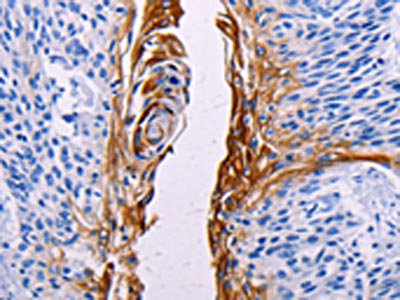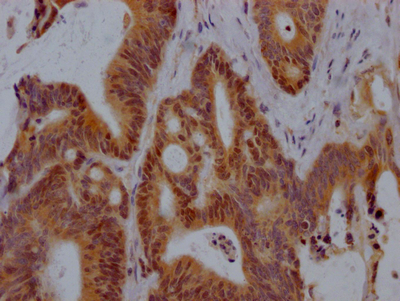FGF7 Antibody
-
货号:CSB-PA204706
-
规格:¥1100
-
图片:
-
其他:
产品详情
-
Uniprot No.:P21781
-
基因名:
-
别名:FGF 7 antibody; FGF-7 antibody; Fgf7 antibody; FGF7_HUMAN antibody; Fibroblast growth factor 7 antibody; HBGF 7 antibody; HBGF-7 antibody; HBGF7 antibody; Heparin binding growth factor 7 antibody; Heparin-binding growth factor 7 antibody; Keratinocyte growth factor antibody; KGF antibody
-
宿主:Rabbit
-
反应种属:Human,Mouse,Rat
-
免疫原:Synthetic peptide of Human FGF7
-
免疫原种属:Homo sapiens (Human)
-
标记方式:Non-conjugated
-
抗体亚型:IgG
-
纯化方式:Antigen affinity purification
-
浓度:It differs from different batches. Please contact us to confirm it.
-
保存缓冲液:-20°C, pH7.4 PBS, 0.05% NaN3, 40% Glycerol
-
产品提供形式:Liquid
-
应用范围:ELISA,IHC
-
推荐稀释比:
Application Recommended Dilution ELISA 1:500-1:5000 IHC 1:10-1:50 -
Protocols:
-
储存条件:Upon receipt, store at -20°C or -80°C. Avoid repeated freeze.
-
货期:Basically, we can dispatch the products out in 1-3 working days after receiving your orders. Delivery time maybe differs from different purchasing way or location, please kindly consult your local distributors for specific delivery time.
相关产品
靶点详情
-
功能:Plays an important role in the regulation of embryonic development, cell proliferation and cell differentiation. Required for normal branching morphogenesis. Growth factor active on keratinocytes. Possible major paracrine effector of normal epithelial cell proliferation.
-
基因功能参考文献:
- Low KGF expression is associated with epithelial ovarian cancer cell proliferation and invasion. PMID: 29970688
- Findings suggest that excessive KGF and KGFR synthesis may contribute to the hyperproliferative state in cholesteatoma and could explain the pathological difference between cholesteatoma and CSOM. PMID: 29556625
- Results suggest that fibroblast growth factor 7 may stimulate endometrial stromal cells proliferation and insulin-like growth factor-binding protein 1 and prolactin expressions through ERK and JNK signal pathways in an autocrine manner. PMID: 28270036
- The stability and activity of rhKGF mutants were analyzed using GROMACS molecular dynamics (MD) simulations and docking tools, respectively. The results showed that N159S (N105S in rhKGF sequence) and I172V (I118V in rhKGF) substitutions caused an increased stability and affinity of the rhKGF to Fibroblast growth factor receptor 2 (FGFR2). PMID: 28093295
- Tregs isolated from human lung tissue can be stimulated ex vivo to induce kgf expression. PMID: 28296468
- FGF7 stimulation of cell invasion and migration was partially suppressed by the FGFR2 knockdown. In addition, FGF7/FGFR2 upregulated THBS1, and cell invasion and migration were decreased by knockdown of THBS1 PMID: 28339036
- Suppression of miR-219-5p may benefit the liver regeneration and prevent cirrhosis through increasing KGF. PMID: 27855391
- This study evaluated the expression of FGF7, AhR, and CYP1A1 in colorectal cancer cells and revealed a new mechanism by which KGF promotes cell proliferation through the AhR-cyclin D1 pathway in colon cancer cells. PMID: 26514676
- KGF expression induced epithelial cell proliferation, reaching a peak level at day 4 and then decreased later, while in the long-term model, KGF expression in the EAC led to middle ear cholesteatoma formation PMID: 25138153
- In the current study, conditioned media and chemically defined media with recombinant human keratinocyte growth factor (KGF) could induce hUC-MSC differentiation into sweat gland-like cells (SGCs). PMID: 26574554
- Coexpression of KGF and MMP-9 in gastric cancer could be a useful prognostic factor, and MMP-9 might also serve as a novel target for both prognostic prediction and therapeutics. PMID: 26350198
- FGF7 over expression is associated with advanced clinical features in patients with upper tract and bladder urothelial carcinoma PMID: 25623741
- Data indicate the key roles played, on the melanosome transfer in normal skin, by KGF/FGF7 released by dermal fibroblasts and by its receptor KGFR/FGFR2b expressed and activated on the epidermal keratinocytes. PMID: 25313018
- First evidence of a role of FGF7 in the regulation of sequential steps of the autophagic process and strengthen the hypothesis of a direct interplay between autophagy and differentiation. PMID: 24577098
- An SNP in FGF7 is associated with an increased risk of chronic obstructive pulmonary disease. PMID: 22796760
- These findings indicate that topically delivered KGF-1 DNA plasmid can increase epithelial thickness and strength, demonstrating the potential of this approach to restore compromised skin. PMID: 24434934
- Recombinant keratinocyte growth factor 1 in tobacco potentially promotes wound healing in diabetic rats. PMID: 24783215
- Sustained effect of KGF on cell survival and proliferation could be attributed to its ability to inhibit p53, retinoblastoma, caspases, and p27(kip) functions in apoptosis and cell cycle arrest. PMID: 24426773
- FGF7 stimulates osteogenic differentiation, but not proliferation, in embryonic stem cells, by activating ERK/Runx2 signaling. PMID: 24026476
- This paper provides an overview of the knowledge on molecular properties, biological functions and the ecent findings on clinical application of EGF7. [review] PMID: 24188496
- High FGF7 expression is associated with ameloblastoma. PMID: 24002438
- IL-19 is important for cutaneous wound healing because it upregulates KGF expression. PMID: 23582717
- FGF7 supports hematopoietic stem and progenitor cells and leukemia-initiating cells indirectly via FGFR2IIIb expressed on stromal cells. PMID: 24051090
- The aim of this study was to determine whether the K-sam gene and keratinocyte growth factor (KGF) expression may be used to identify malignant tumors with a poor prognosis. PMID: 23545898
- KGF could up-regulate IL-7 expression through the STAT1/IRF-1, IRF-2 signaling pathway, which is a new insight in potential effects of KGF on the intestinal mucosal immune system. PMID: 23554911
- The LTA downstream segment alternate core promoter was active only after specific cellular stimulation and was the major promoter used when human T cells were stimulated with TGF-beta1 and fibroblast growth factor-7. PMID: 23547113
- Increased KGF expression promotes fibroblast activation in a double paracrine manner resulting in cutaneous fibrosis. PMID: 23096718
- results implicate pericryptal myofibroblast-derived paracrine KGF and largely autocrine amphiregulin in the upregulation of claudin-2 in Caco-2 epithelial monolayers and consequent disruption of tight junction integrity PMID: 22946653
- Keratinocyte growth factor up-regulates Interleukin-7 expression following intestinal ischemia/reperfusion in vitro and in vivo. PMID: 22949940
- the activation of the stromal fibroblasts present in the pathological tissue, and the consequent increased secretion of KGF, play a crucial role in the deregulation of the epidermal proliferation and differentiation. PMID: 22481617
- these data suggest that FGF7 is a novel regulator of CYP7A1 expression in hepatocytes and may prevent hepatocytes from accumulating toxic bile acids during liver injury and fibrosis. PMID: 22713451
- Repression of Ink4a in aged (ETPs) Early T-cell progenitors results in their partial rejuvenation and this can be accomplished by in vivo fibroblast growth factor 7 administration. PMID: 22555975
- In COPD, SNPs (rs12591300 and rs4480740) were significantly associated with COPD in an independent population (combined p values of 7.9E-7 and 2.8E-6). Increased lung tissue FGF7 expression was associated with worse measures of lung function. PMID: 21921092
- FGF7 enhanced keratinocyte proliferation and its expression was increased when NCTC 2544 cells were subjected to treatments with plantaricin A preparations or hyaluronic acid. PMID: 21782870
- Carcinoma-associated fibroblasts promotes the proliferation of a lingual carcinoma cell line by secreting keratinocyte growth factor. PMID: 21340484
- KGF may have a role in ameliorating radiation-induced pulmonary injury in rats PMID: 21436609
- These results suggest that the growth factors HGF and KGF may play a role in enhancing IL-1-stimulated production of IL-8 by epithelial cells during mucosal inflammations. PMID: 21082280
- KGF increases pigment production and deposition in melanocytes in vitro and in vivo PMID: 19780816
- The upregulation of KGF/KGFR might induce the formation of rete ridges and hyperpigmentation in solar lentigines. PMID: 20620021
- Modulation of calprotectin in human keratinocytes by keratinocyte growth factor and interleukin-1alpha. PMID: 20065999
- the expression of keratinocyte growth factor (KGF) and keratinocyte growth factor receptor (KGFR) in Hela cells PMID: 17593825
- KGF and KGFR are both expressed in CaSki cells. Autocrine and recombinant human KGF affect cell proliferation and migration. PMID: 17953372
- keratinocyte growth factor works via an inducible lentivirus to protect bone marrow cells against bleomycin-induced pulmonary fibrosis PMID: 19956603
- The goal of this study was to elucidate the control mechanisms by which exogenous proteins regulate keratinocyte growth factor (KGF) expression in fibroblasts adhered to differing substrates. PMID: 20036421
- The effect of KGF on limbal epithelial cell growth is mediated by upregulation of DeltaNp63alpha through the p38 pathway. PMID: 19920075
- KGF induced proliferation but did not cause significant differentiation of 3 hematopoietic cell lines and bone marrow cells transduced with human K-sam. PMID: 11937263
- play important roles in lung development, lung inflammation, and repair. PMID: 11943656
- keratinocyte growth factor (KGF), a key stimulator of epithelial cell proliferation during wound healing, preferentially binds to collagens I, III, and VI. PMID: 11973338
- KGF may hold promise for the treatment of very premature neonates with bronchopulmonary dysplasia. PMID: 12016100
- Following activation by KGF binding, KGF and the KGF receptor remain associated in active complexes through the endocytic pathway, which is described. PMID: 12122441
显示更多
收起更多
-
亚细胞定位:Secreted.
-
蛋白家族:Heparin-binding growth factors family
-
组织特异性:Epithelial cell.
-
数据库链接:
HGNC: 3685
OMIM: 148180
KEGG: hsa:2252
STRING: 9606.ENSP00000267843
UniGene: Hs.567268
Most popular with customers
-
YWHAB Recombinant Monoclonal Antibody
Applications: ELISA, WB, IF, FC
Species Reactivity: Human, Mouse, Rat
-
Phospho-YAP1 (S127) Recombinant Monoclonal Antibody
Applications: ELISA, WB, IHC
Species Reactivity: Human
-
-
-
-
-
-





















